Livestock Attacks Cost to UK Farmers £1.95 Million in 2025

Livestock Attacks Cost to UK Farmers £1.95 Million in 2025 Rural communities are facing a growing threat from dog attacks on farm animals. According toNFU Mutual reports 2025, livestock worrying caused an estimated £1.95 million in losses, a 10 % increase from 2024. A survey of 1,407 dog owner’s highlights worrying trends: over 57 % let their dogs the off lead in the countryside, 1 in 10 dogs have no recall, 1 in 20 have chased livestock, and 72 % of owners are not taking steps to prevent chasing. Even calm or friendly dogs can chase livestock, and the stress alone can seriously harm or even kill pregnant ewes and newborn lambs. Rob Taylor, NPCC’s livestock attacks lead and NRCN Board Member, stresses that responsible ownership is key to preventing these incidents. With countryside visits set to rise, the NRCN and our partners are encouraging: Keep dogs on a lead anywhere livestock may be present Let go of the lead if chased by cattle, for your own safety Never let dogs roam unsupervised, even in gardens near livestock fields Report any incidents to the police or local farmers immediately Recognise that all dogs can chase or injure livestock, regardless of size or breed Together, we can prevent distressing and costly attacks this season. The upcoming Dogs (Protection of Livestock) (Amendment) Act gives police stronger powers in England and Wales. Everyone can help by keeping dogs on a lead near livestock, supervising them, and reporting incidents immediately. Together, we can help prevent distressing and costly attacks this season.
Countryfile Exposes the Reality of Rural Abuse
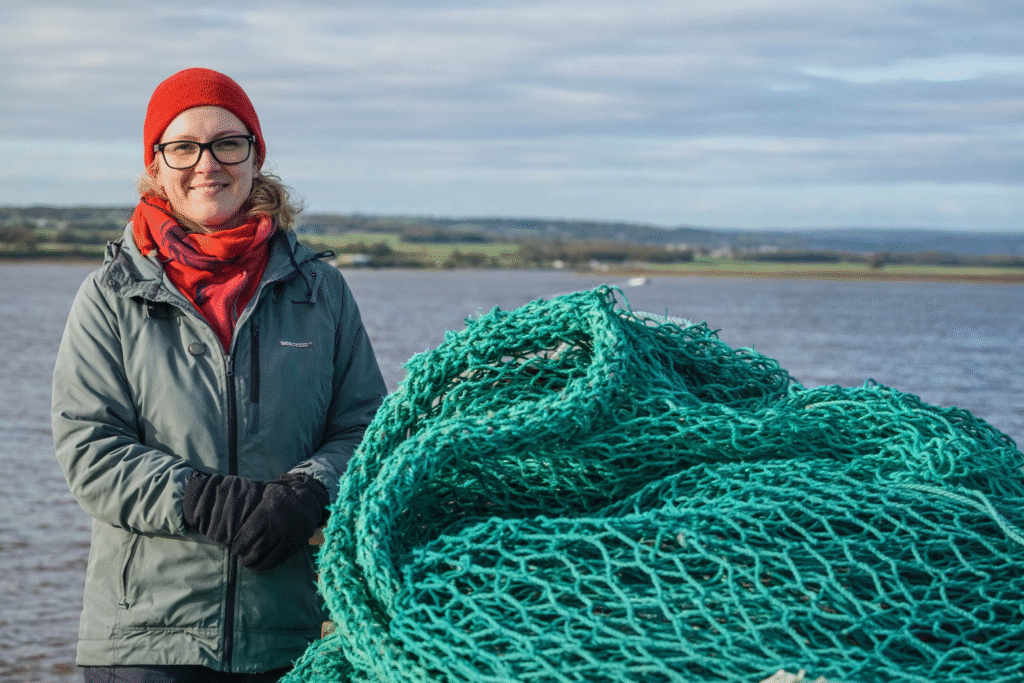
Countryfile Exposes the Reality of Rural Abuse Countryfile Exposes the Reality of Rural Abuse We need Action on Tackling Rural Domestic Abuse! We are pleased to see BBC Countryfile highlight the often hidden realities of rural domestic abuse, stalking and sexual violence. The NRCN’s groundbreaking research, published nearly seven years ago, remains just as relevant today, but awareness alone isn’t enough. We need action. Rural domestic abuse isn’t worse than abuse elsewhere, but it is different, and it demands a different response. Yet the Government’s recent VAWG strategy contains no dedicated rural measures. We’ll continue pushing for the recommendations of Captive and Controlled to be implemented and proudly stand alongside Judith Vickress, RiTA (Rural Initiatives Tackling Abuse), and others driving real change. A huge thank you to Rhianon Bragg, whose courage in sharing her story helps ensure the government and the public understand the unique challenges survivors face in rural communities.
National Rural Crime Action Week Press Release
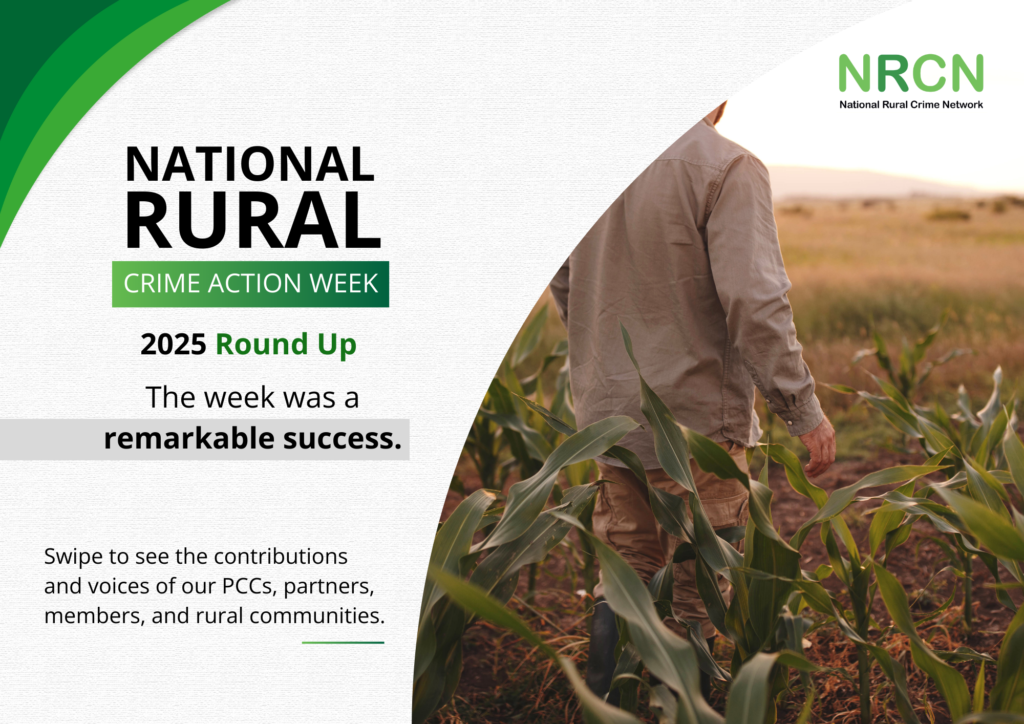
National Rural Crime Action Week Press Release National Rural Crime Action Week 2025: A United Voice for Rural Communities The National Rural Crime Network (NRCN) has concluded a powerful week of awareness, action, and partnership through National Rural Crime Action Week 2025 – bringing widespread attention to the true cost of rural crime and showcasing the initiatives being taken to protect countryside communities. This year’s theme – “Voices from the Countryside” – placed rural experiences at the centre of the conversation. From theft of machinery and fly-tipping to domestic abuse in isolated areas and arson devastating farms, the week highlighted that rural crime is a serious and costly threat that undermines livelihoods, safety, and resilience across the UK. The week opened with day one themed ‘What You Don’t See’ focusing on the hidden costs of rural crime – the damage that is not always visible. From the disruption caused by stolen tractors, quads, and GPS systems to the erosion of community confidence, the message was clear: prevention matters. Simple layered measures – from secure gates and alarms to forensic marking and accurate inventories – can reduce risk and strengthen resilience. Day two highlighted, ‘Rural Forces Rising’ – the role of proactive rural policing. From specialist rural crime teams to new technology such as drones, mobile CCTV, and Automatic Number Plate Recognition (ANPR), the campaign showed how enforcement and visibility are making rural areas more hostile to organised criminals. Collaboration between police, landowners, and rural residents remains key to tackling theft, poaching, hare coursing, and fly-tipping. The mid-week (day three) stressed on the theme, ‘Rural Crime is Bigger Than You Think’ – the breadth and scale of rural crime. Beyond machinery theft and environmental damage, rural communities face hidden harms including domestic abuse, economic coercion, and isolation. The day also focused on the vital role of farming and food security in rural life, highlighting how protecting agriculture goes hand in hand with tackling rural crime. In many areas, where “everyone knows everyone,” the fear of being judged or exposed can prevent people from seeking the help they need. Limited public transport, fewer specialist services, and distance from larger towns or cities can further isolate residents, creating real barriers to safety and support. Highlighting these hidden struggles, day four with a theme, ‘Isolated, Not Alone’ emphasised the importance of visibility, outreach, and collaboration, showing that no one in the countryside has to face these challenges alone. The final (fifth) day, themed, ‘The Power of Policy’ – underlined the role of legislation and targeted investment in empowering communities. From the Equipment Theft (Prevention) Act 2023 to new funding streams supporting rural policing, effective policies can deter criminals and ensure long-term security. Rural voices remain central to shaping the decisions that protect them. The NRCN’s partners – the Country Land and Business Association (CLA), the National Farmers’ Union (NFU), the Rural Services Network, and the Willow Project – stood at the forefront throughout the week, amplifying rural voices and driving home the message that rural crime must be treated as a national priority. Alongside them, a wide range of organisations, community groups, businesses, and individuals joined forces to share insights, raise awareness, and stand in solidarity with rural communities. Tim Passmore, Chair of the National Rural Crime Network, said: “This year’s Action Week brought the real voices of rural communities to the forefront. The message is clear – rural crime is a significant and pervasive threat, and rural communities will not be left behind. From innovation in policing to national campaigns on farming and domestic abuse, we have shown what can be achieved when we work together. The NRCN will continue to fight for rural communities, ensuring they are safe, supported, and heard.” The NRCN thanks all partners, supporters, and individuals who helped make National Rural Crime Action Week 2025 a success. Together, we can protect livelihoods, strengthen communities, and make rural Britain safer.
Unseen, Unheard, Unprotected

Unseen, Unheard, Unprotected When we talk about domestic abuse, most people picture city life, close neighbours, public services, and quick escape routes. But what happens when that same abuse is unfolding in a remote village, away from the nearest town, and without a soul around for miles? That’s the harsh reality. Domestic abuse exists everywhere, including rural areas, and its effects are often far-reaching. It is time to take a closer look at what is really going on and understand the challenges faced by those affected. The Hidden Reality of Rural Abuse Abuse in remote areas is frequently a subtle, hidden force rather than simply a violent act. Many people think that rural areas provide a secure haven because of their beautiful scenery and connected communities. For individuals who are abused, however, the situation is quite different. Lack of privacy, lack of support options, and transportation barriers make it more difficult for victims to escape their situation. In reality, survivors of abuse in rural areas frequently encounter more barriers when attempting to get assistance. In tightly connected communities where privacy is limited and people are frequently more focused on maintaining their reputations than resolving underlying problems, the stigma associated with domestic violence is intensified. Isolation: The Silent Barrier Rural victims of domestic abuse frequently have nowhere to turn, unlike urban areas where shelters, support systems, and advocacy groups are more readily available. Limited access to public transport means victims struggle to get to local services, and long distances between towns or villages can make it difficult to reach out for support. This isolation adds to the controlling aspect of abuse because abusers often utilise communication and transportation control to further isolate their victims from any kind of support. Rural abuse is not just about physical violence; it is about emotional manipulation, isolation, and the overwhelming sense of helplessness that survivors often feel. Shifting Perceptions: Breaking the Silence One of the most powerful tools in the fight against rural abuse is raising awareness. The more people understand the signs of abuse, the better equipped they are to support victims in their communities. The more aware we are, the better we can help safeguard our community in these situations. The Willow Project: A Lifeline for Rural Communities At the National Rural Crime Network, we recognise that rural victims of domestic abuse often face significant barriers when seeking safety and support. That is why we are proud to work alongside The Willow Project, an initiative making real, local impact where it is most needed. We are working with The Willow Project to change the story for rural survivors of domestic abuse. Their outreach, safe spaces, and specialist support are creating lifelines where there were once none. Together, we are amplifying rural voices, challenging the systems that overlook them, and pushing for real change in how abuse is recognised, reported, and responded to, no matter the postco Conclusion Domestic abuse does not stop at the city’s edge. In rural communities, it remains one of the most hidden and under-acknowledged crimes, shaped by isolation, stigma, and poor access to services. The Willow Project and NRCN are bringing attention to the issue, offering support to survivors, and encouraging communities to be more proactive in helping their neighbors. On 2nd June 2025, we convened a dedicated Domestic Abuse Working Group, bringing together frontline organisations, researchers, rural safeguarding leads, and specialist support providers from across the UK. Together, we examined the persistent gaps in rural provision, the barriers survivors face, and what meaningful, localised solutions must look like. As part of this, we have launched the Rural Domestic Abuse Working Group to help include rural needs into the Government’s Violence Against Women and Girls (VAWG) strategy, ensuring the specific challenges of rural survivors are no longer sidelined in national decision-making. If you’re in policing, frontline support, or rural leadership, we’d like for you to be a part of this ongoing effort. Together, we can ensure that rural abuse is not hidden anymore and that every survivor has a chance to be heard, seen, and supported.
NRCN Annual Conference 2025

You are unauthorized to view this page. Username Password Remember Me Forgot Password
WhatsApp In Rural Crime Prevention
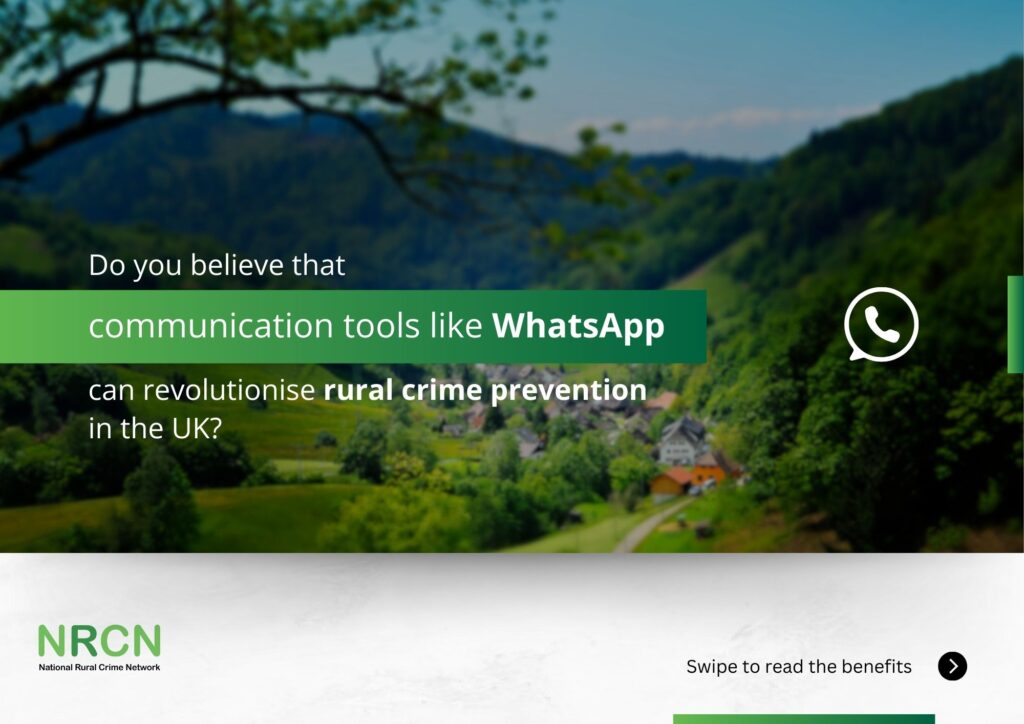
WhatsApp In Rural Crime Prevention Innovative tools like WhatsApp are proving to be valuable assets in the fight against rural crime. By enabling quicker communication between community members and authorities, we can respond faster and more effectively to incidents. Swipe through the carousel to understand how this technology-driven approach is just one of the many steps we need to enhance rural safety and security, ensuring that even remote areas are better protected.
Imapct of Fly-tipping
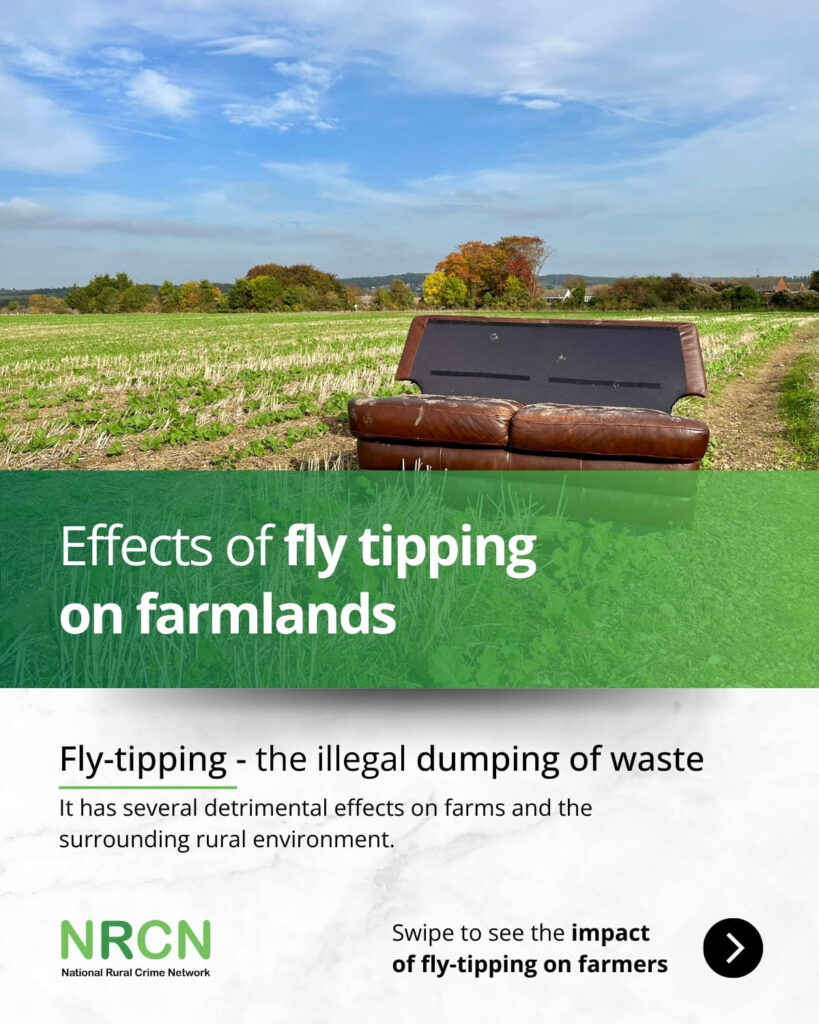
Impact of Fly-tipping Fly-tipping is a constant plague on farmlands, causing significant damage to the environment and local farming communities. Swipe through the carousel to understand how illegal waste dumping on farmlands is affecting farmers. By raising awareness and enforcing stronger penalties, we can work together to tackle this growing issue.
10 Worst affected Counties by Cost in 2023 as per NFU Mutual
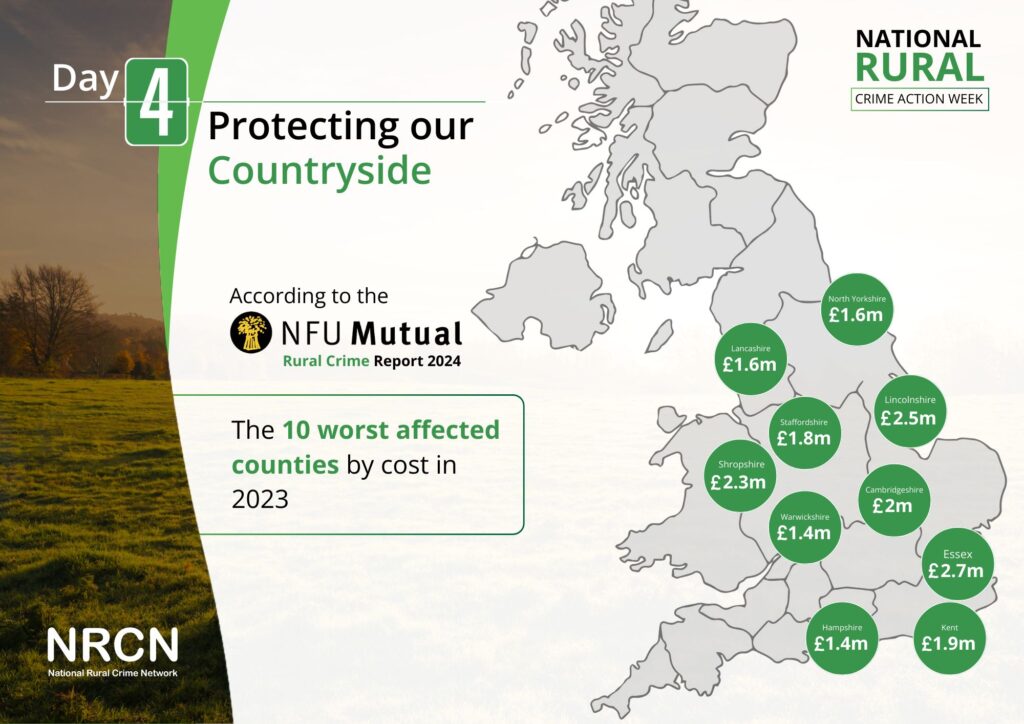
19 September, 2024 10 Worst affected Counties by Cost in 2023 as per NFU Mutual It is day 4 of National Rural Crime Action Week 2024, where our focus is on Protecting our Countryside! The NFU Mutual Rural Crime Report 2024 has revealed a stark reality that demands our attention. These figures highlight the urgent need for action and collaboration within our communities. This week is not just about raising awareness; it is about empowering residents and law enforcement to take a stand against rural crime. Let us unite for #ProtectingourCountryside.
Rural Crime Report 2024 by NFU Mutual

19 September, 2024 Rural Crime Report 2024 by NFU Mutual NFU Mutual’s latest figures show a 4.3% rise in 2023, pushing the cost of crime in rural areas to a staggering £52.8m. Criminal gangs are increasingly targeting farmyards and fields, capitalising on high inflation and strong resale markets both in the UK and overseas. The impact is felt across rural communities, with theft of farm machinery, tools, livestock, and even large-scale fly-tipping contributing to this surge. These crimes are not isolated incidents; they are often part of organised criminal networks that operate across regions, leaving rural communities vulnerable. Rural crime is a serious issue, but with vigilance and the right preventive measures, we can work together to reduce its impact. To know more, read NFU Mutual’s complete Rural Crime Report 2024 now: https://www.nfumutual.co.uk/farming/rural-crime/.
‘How farms are being targeted by criminal gangs stealing machinery to order for Russia’ – ITVnews Segment

14 May, 2024 ‘How farms are being targeted by criminal gangs stealing machinery to order for Russia’ – ITVnews Segment According to a recent segment by ITVnews featuring Chair of NRCN, Tim Passmore, an average of 170 agricultural vehicles are stolen every month! https://youtu.be/r2SQbMSupks?si=hWTY-KtLTdNgsZ44 Watch this interview featuring the Chair of the NRCN, Tim Passmore, to learn about how these stolen goods are making their way out of the country, leaving our farmers without the tools they need to make a living. As highlighted by Tim, criminals are increasingly targeting this equipment due to the high prices they can fetch on the black market. This calls for a stronger police presence in rural areas to deter criminals and improve response times. Additionally, farmers need access to more effective security measures, such as GPS tracking, forensic marking for equipment, and improved fencing. Watch the complete story on ‘how farms are being targeted by criminal gangs stealing machinery to order for Russia’ now!
Dr Kate Tudor on BBC Radio – Farming Today

14 March, 2024 dr. Kate Tudor on BBC Radio – Farming Today Let’s hear directly from Dr Kate Tudor – the author and researcher behind our latest report on ‘Rural Crime: Serious Organised and International’. https://youtu.be/gkrtcphXCJg Along with the key findings, Dr Tudor also discusses the misconceptions related to rural crime and the need for targeted strategies with BBC Radio 4 – Farming Today. Listen to the full segment!
The Telegraph Exclusive on the NRCN Report

08 March 2024 The Telegraph Britain’s rural communities ‘being targeted by foreign drug gangs’ Read the exclusive article published by The Telegraph here. Download the NRCN Report on ‘Rural Crime: Serious Organised and International‘ for free.
Welcome from Tim Passmore, Chair of the National Rural Crime Network

17 May 2021 Welcome from Tim Passmore, the National Rural Crime Network’s new Chair I am delighted to be able to write to you as both the re-elected Police and Crime Commissioner for Suffolk and the new Chair of the National Rural Crime Network. I have been the Vice-Chair of this organisation since we were formed in 2014. Things are better than they were then – there are more rural crime teams, more understanding of the problems faced in rural communities and more attention on the challenged faces in our most remote and sparsely populated areas. Better. But with a huge amount more to do. Rural crime is an issue that has never had the attention it deserved on the national agenda. In the past seven years since the NRCN was formed, we have made progress but let’s not underestimate the task that remains. As a farmer and a businessman, I have seen all too often at first-hand the impact of crime on rural communities. For some it still can seem trivial. Too many within government, within the police and within the country as a whole, question whether crime like the theft of machinery from a farm is a big deal. Those of us who live and work in rural areas know the impact it has – it can mean crops are ruined because they cannot be harvested, jobs and livelihoods of those employed are under threat and farmers’ families end up living in fear of criminals targeting their property. Since 2014, the NRCN has become a voice to be listened to when we have put the spotlight on some of the big issues we face – whether it’s the impact of domestic abuse or the growing threat of hare coursing. I want to pay tribute to Julia Mulligan as she steps down both as the Police, Fire and Crime Commissioner for North Yorkshire and as Chair of the NRCN. She has done a huge amount to improve the lives of people in rural areas, I thank her for everything she has done and wish her good luck in her new roles. As Chair, I will continue and strengthen our work so that we know the true picture of crime in rural communities, understand the impact it has, and use that to ensure the police, government and others find solutions to the challenges that have existed for too long and blighted the lives of too many. I am also looking forward to working alongside our new Vice-Chair, Peter McCall – the Police and Crime Commissioner for Cumbria – and our newly elected Executive Board. From our partner members: Countryside Alliance – Sarah Lee Crimestoppers – Mick Duthiie NFU – Sam Durham Rural Services Network – Graham Biggs And, from our Police and Crime Commissioner members: Devon & Cornwall –Alison Hernandez Essex – Roger Hirst Lincolnshire – Marc Jones Sussex – Katy Bourne I look forward to getting started and discussing all of the issues we face – and what we do about them – in the weeks and months ahead.
NFU launch Cyber Security Guide for farmers

12 March 2020 NFU launch Cyber Security Guide for farmers NRCN-member, the National Farmers Union (NFU), has partnered with the National Cyber Security Centre (NCSC) to produce an online booklet to support farmers in preventing and reporting cybercrime. Cyber-attacks are on the rise, they can be financially devastating, disrupting and upsetting to individuals and businesses. Cybercriminals aim to exploit human or security vulnerabilities in order to steal passwords, data or money directly, and the agricultural sector is no exception. Almost half (46%) of businesses identified cyber security breaches or attacks in the last 12 months. This criminal trend is an on-going threat to businesses of all natures and sizes, it is not just the larger organisations that need to invest in cyber security. Cyber security can often appear to be a complex and daunting subject, but prevention plays an important role in tackling the crime. The NFU hopes this booklet will provide farmers with practical, step-by-step guidance that can easily be implemented to build towards better resilience against cybercriminals and reduce their chances of being targeted. Download the guide here >>
Captive & Controlled – One Year On: Challenging Attitudes & Changing Lives in Derbyshire

13 July 2020 Captive & Controlled – One Year On: Challenging Attitudes & Changing Lives in Derbyshire Derbyshire was one of the counties which took part in the 2019 research by the National Rural Crime Network and led to the Captive & Controlled report. For the first time, the differences between rural and urban domestic abuse were recognised in this way. And so, as Derbyshire, with the exclusion of Derby City, is mostly rural this report was of particular interest. By Emily Brailsford This need for a rural focus on domestic abuse was highlighted because of the different challenges that victims living in rural areas face. Derbyshire’s Office of the Police and Crime Commissioner considered this information carefully and decided to fund The Willow Project in February this year. This meant that there was only a matter of weeks to start work on the project, before the whole country was shut down by Coronavirus. Sadly this meant that domestic abuse was on the forefront of everyone’s minds. So instead of gently easing into our role, we had to hit the ground running here at The Willow Project. Our main focus is to raise awareness. In normal circumstances this would be done by giving talks and presentations, visiting community groups and country shows. But, because of lockdown we have had to change our plans and learn how to do all of this digitally. We also plan to deliver training to various different groups of people such as vets and school safeguarding staff, once we are safely able to. The last strand of the service is to recruit a team of ‘champions’, people within the community who will work to raise awareness around domestic abuse. The Willow Project isn’t a frontline service and champions won’t deal directly with victims, except in an emergency. What the project hopes to do, is to work closely with the amazing domestic abuse services we have here in Derbyshire, supporting them in raising awareness so that they can concentrate their time and their funding on working with victims. Hosted by Rural Action Derbyshire, The Willow Project aims to raise awareness around the different challenges faced by victims of domestic abuse living in rural areas. For more information on The Willow Project, please visit the website. Follow us on Twitter and Facebook, LinkedIn. Or email Emily Brailsford, Project Officer at e.brailsford@ruralactionderbyshire.org.uk or call her on 07594 088858
Captive & Controlled – One Year On: What’s Changed?

13 July 2020 Captive & Controlled – One Year On: What’s Changed? In July 2019, the National Rural Crime Network revealed an alarming picture – the truth behind domestic abuse in rural Britain, with hidden victims being found to be ‘isolated, unsupported and unprotected.’ One year on from its launch, we consider what has changed since the release of the report, and whether there has been progress on the recommendations made. Last year’s report revealed that abuse lasts, on average, 25% longer in the most rural areas, the policing response is often largely inadequate, and the more rural the setting, the higher risk of harm. The harrowing findings of the report also revealed rurality and isolation are deliberately used as weapons by abusers. One recommendation which was made in the report, was a call for the government to apply its ‘rural proofing’ policy to domestic abuse, to account for specific needs of victims and survivors in rural communities. The Domestic Abuse Bill being introduced at the end of last year was a step in the right direction, however there is still more that could be done in order to reflect the needs or rural Britain. This Domestic Abuse bill is important though in order to be able to protect victims of domestic abuse and bring the criminals to justice and we should not underestimate its significance, particularly with the amendments which have been made during its progression through Parliament. Additionally, since the release of the report, an overhaul of family courts has been put in progress, striving to protect domestic abuse victims and their loved ones. This overhaul will give victims of domestic abuse special protections in court such as separate building entrances, waiting rooms, and protective screens to shield them from alleged abusers in court. This has been an immense change, supporting those vulnerable and exposed victims. Julia Mulligan, Chair of the NRCN: “We warmly welcome the news that the Government will be taking forward a range of measures to support survivors of domestic abuse and their children in the Family Court and to ensure that they receive greater protection. “For far too long, the support and protections that should be available to survivors of domestic abuse through the criminal justice process simply do not exist, and it can be a struggle from the moment the survivor steps into the Family Court. “We welcome the fact that, having taken note of feedback and conversations, the report had recommended positive change and collective improvement. We have been calling for this to change for a number of years and the announcement is an important first step; we must now ensure that the commitments announced today are delivered as quickly as possible.” One of the other recommendations included in the report asked for support services for rural victims to be improved. Our report highlighted the challenges in accessing these services if you lived a long way from an urban area, leaving victims often isolated and struggling to access help. A £2m fund was set up in the past year to try and combat that – to both support the victims and also launch a public awareness campaign. It emphasised the need for people to look out for vulnerable members of communities, in particular any victims of abuse, and was a welcome move. Despite these promising steps, there is still much more that can be done in order to further support rural services and victims. With many people experiencing the true meaning of isolation themselves this year, it is essential that momentum is continued to support those in need. It is feared that this funding, for example, which was also used for the public awareness campaign, will only offer short-term support for those needing it. With the current global pandemic also meaning the furlough scheme will be in place until October, there are now fears that more problems will arise at the end of the year, with demand for support on the rise. The domestic abuse support fund, also expected to end in October, might not offer support to those who need it when many of the perpetrators of abuse will, inevitably, return to work. Unfortunately, rural issues are all too often still overlooked, and such funding and support for victims is not distributed equally. The current pandemic has meant police attention has also been diverted elsewhere, potentially leaving victims alone, isolated and unsupported. After a 12 months the like of which none of us could have predicted, progress has been slow – but there has been progress. There needs to be much more though to support the victims who are still too often hidden away, captive and controlled.
NFU launch Farm Security Guide
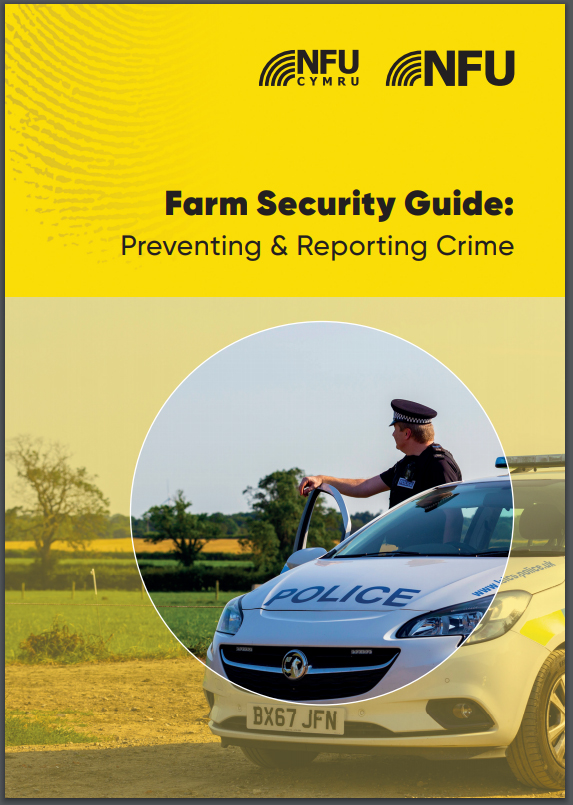
12 March 2020 NFU launch Farm Security Guide NRCN-member, the National Farmers Union (NFU), have launched a “Farm security guide” to support its members in preventing and reporting rural crime. With the cost of rural crime at its highest since 2011, it is an ever-increasing policy area for the NFU. The organisation works hard to raise the issue of rural crime with the police, local authorities, and at the highest level of government. The NFU is dedicated to its members and provides the best possible support and advice. There are a range of tools currently available for farmers and landowners, including an online rural crime hub, a dedicated rural crime hotline, and a number of publications and reports. To further this, last month the NFU released a “Farm Security Guide” during its rural crime workshop at the NFU Conference 2020. The Farm Security Guide offers key advice to its members on measures they can take to protect their farming business and how to report a crime effectively. Prevention plays an important role in reducing rural crime, and by putting a few measures in place, farmers can reduce their chances of being targeted. Farms are often not only businesses but also family homes, so it is important to take every appropriate measure to protect them. Inside the manual, there are 10 crime prevention tips for your property/land. The NFU has also partnered with several leading security and service brands to offer members exclusive discounts. Through a close working relationship with the police, the NFU recognise the importance of reporting a crime effectively. Not only is it important to gather data on rural crime, but it is also vital to give the police as much relevant and accurate information as possible. The booklet provides an essential step-by-step guide to reporting crime, specific to different offences, to ensure our members have the appropriate information. So far, the guide has received positive feedback, and the NFU hopes that by sharing this knowledge with farmers and landowners, we can tackle rural crime with a consistent and coordinated approach. You can download it here >>
RSPCA Inspectors join fight against Domestic Abuse in North Yorkshire

16 December 2019 RSPCA Inspectors join fight against Domestic Abuse in North Yorkshire 20 RSPCA Inspectors recently took part in training coordinated by North Yorkshire Police to help them spot the signs of domestic abuse and know how to report it. The training is the first of its kind and was delivered in partnership between North Yorkshire Police, Independent Domestic Abuse Services (IDAS), Victim Support North Yorkshire and the RSPCA. Officers from North Yorkshire Police’s Rural Taskforce helped to set up the training day which was opened to RSPCA Inspectors across the North of England. North Yorkshire Police Inspector, Jon Grainge said: “Partnership working is fundamental to tackling all aspects of crime and the idea for this training came about during discussions with the various organisations involved. Many of the locations in which our officers and RSPCA Inspectors work are rural and sometimes very isolated so can be particularly vulnerable and we hope this training will provide another important tool in supporting these communities.” North Yorkshire Police Domestic Abuse Coordinator, Rebecca Cobby, said: “The training was really well received by everyone who attended and is a fantastic example of how effective partnership working can be. “The National Rural Crime Network ‘Captive and Controlled’ report 2019, showed that domestic abuse lasts on average 25 per cent longer in the most rural areas. One of many factors contributing to this is that victims may have animals and livestock that they need to care for, making it more difficult for them to leave their abuser – further highlighting the importance of this partnership. “The more eyes and ears who can help spot the signs and know how to report domestic abuse, the greater support for victims and the more people who can be armed in the fight to put a stop to domestic abuse.” RSPCA Inspector and National Wildlife Officer Coordinator, Geoff Edmond, was instrumental in coordinating the training. He said: “The RSPCA Inspectorate welcomed the opportunity to work in partnership with North Yorkshire Police and IDAS. The recent training day held at North Yorkshire Police HQ allowed our Officers not only from North Yorkshire but from across the North East of England and Lincolnshire to gain a greater understanding and awareness of domestic abuse and how to work together across partner agencies to help safeguard those at risk.” Feedback from participants included: “I really enjoyed it course I found it highly informative and the information was very relevant to our role, I could think of examples of the sort of things we discussed and feel much better prepared for spotting the signs and directing people to help/support.” “I found it very informative and eye opening and I learnt a lot about signs of abuse and how to go about reporting it if I suspect there is a domestic violence issue at an address I attend.” Read more about our report on Domestic Abuse in Rural Areas here >>
Rural Crime Week of Action in Warwickshire

21 October 2019 Rural Crime Week of Action in Warwickshire During the week, as part of the national Rural Crime Week of Action, officers from around Warwickshire, including the new Rural Crime Team – launched during the week, have been proactively engaging with rural communities at events, engagements and on their beat areas. Meetings and engagement events attended have included Young Farmers Meeting at Dunchurch, Warwickshire British Horse Society, the livestock markets at Stoneleigh (Rugby market) and Stratford, a horse tack marking event, NFU, West Midlands Border forces meeting, visit to Warwickshire & Nuneaton Wildlife Sanctuary with the cadets and Alex Goodwin, plus an SNT event in Fillongley village hall. Patrols and visits have been conducted to address poaching, coursing, heritage crime, wildlife, equine, angling incidents, fly tipping, speeding, parking, antisocial behaviour, numerous farms and rural businesses across the whole of the county. High visual patrols have been conducted in villages and rural areas where concerns have been made. Social media was also used throughout the week to promote and inform the rural communities and partners of the work of the force in tackling rural and wildlife crime and the activities that have taken place. Read more about the new Rural Crime Team here >>
Putting the spotlight on domestic abuse in Avon & Somerset

07 April 2015 Putting the spotlight on domestic abuse in Avon & Somerset Between the 25 November and 10 December, Avon and Somerset Police are marking the 16 Days of Action against Gender Based Violence, which began with the UN International Day for the Elimination of Violence against Women. By Superintendent Deryck Rees The premise of the 16 days of action is to raise awareness of the fact that women around the world are subject to rape, domestic violence, and other forms of violence; it’s an opportunity to highlight the scale and true nature of an issue that is often hidden. The focus of our campaign, this year, will be on the issue of domestic abuse in rural areas, where victims can feel more isolated, and may find it harder to access services than those living in more urban areas. According to the National Rural Crime Network’s research: Domestic abuse, on average, lasts 25% longer in rural areas. Rural victims of DA are half as likely to report their abuse to others. Close-knit rural communities can keep DA hidden, facilitating abuse. Rurality and isolation are used to the advantage of abusers. Support services are scarce, less available, visible, and effective. Rural victims are isolated, unsupported, and unprotected in rural areas, which is ‘normalised’. Throughout the 16 days, we will be striving to build community cohesion in rural areas by encouraging those living in more isolated locations to look out for the signs of domestic abuse and how they can report to the relevant services. Our PCSOs will be attending Talking Cafes across Avon and Somerset to talk about domestic abuse and shed light on the services available to survivors. There is no ‘them and us’ when we’re thinking about victims and survivors of domestic abuse. They are our friends, our family, our neighbours and our colleagues. It’s not always easy to immediately recognise the signs that someone is being abused. But, we are encouraging those who notice something isn’t quite right with a friend, neighbour, or someone from their community, to look, listen, as and ask again. Some of the things to look out for could be a friend being texted an inappropriate number of times by their partner when they aren’t together, a sudden lack of contact from someone, or overhearing abusive language from neighbours during an argument. During the 16 Days of Activism we want to send the message that domestic abuse isn’t something limited to urban areas, it can happen anywhere, and to anyone. We all have a responsibility to look out for the signs of someone being manipulated and abused. If you do decide you would like to speak to the police, you can call 101. Or you can get advice from specialist services in your area. If you or someone else is in immediate danger – call 999.For more information about domestic abuse, please visit www.thisisnotanexcuse.org
Welcome from Simon Prince

07 April 2015 Welcome from Simon Prince As the National Policing Lead for Rural and Wildlife Crime my role is to give guidance and direction on the development of policing services, akin to the two areas of responsibility, to all police forces in England and Wales. As the National Policing Lead for Rural and Wildlife Crime my role is to give guidance and direction on the development of policing services, akin to the two areas of responsibility, to all police forces in England and Wales. Wildlife crime is catered for with the National Wildlife Crime Unit playing a major role in standardising investigations and linking up many partnerships with various other law enforcement agencies and Non-Government Organisations. Rural crime, however, is difficult to define hence the portfolio has to look closely at this area of policing not just as a crime issue but more broadly as ‘rural affairs.’ Rural based crime and issues that can affect rural life has many anomalies to urban crime. Although the categories of crimes are the same e.g. theft, burglary, drugs etc. their impacts on rural communities can be far reaching. A burglary in a town of 20,000 people may only impact on a small percentage of that community. The same burglary in a village of 200 people, however, can impact on all the residents. Replicate this in every hamlet, village and small market town in England and Wales and you can quickly see how important it is for policing to get it right. Building the trust and raising confidence in our rural communities is paramount for rural policing to have the desired impact. We need to listen, take action, tackle, disrupt and prevent crime and anti-social behaviour in our rural communities. Although crime rates are falling we must strive to bring offenders to justice and by working better and smarter with our rural communities we can achieve this. The National Rural Crime Network can assist operational policing in achieving our goals. It can listen to and speak on behalf of the rural communities ensuring that on the ground policing is tackling the important issues, however small they may seem to others. By highlighting the issues, it can influence the guidance and direction taken in rural policing. By working with the College of Policing, we can collectively develop working programmes and Authorised Professional Practices that can deliver the appropriate service to our rural communities. I look forward to working alongside the NRCN.
Welcome from Julia Mulligan

07 April 2015 Welcome from Julia Mulligan Growing up on a hill farm, and now being the Police and Crime Commissioner for the largest rural police force in the country, I am acutely aware of the blight rural crime can have on our more isolated people, communities, and businesses. Through no one’s fault, rural crime has fallen down the agenda, now seemingly an afterthought coming a distant second behind ‘serious’ crime in ‘urban’ areas. That needs to change, and it is changing. The National Rural Crime Network (NRCN) is a positive step forward, highlighting the needs of rural communities and the exploring the toll of hidden crime. Those of us involved in the NRCN, and anyone supporting our cause, will be writing blog posts to keep you up to date with developments. With everyone’s help we can make sure rural crime is front and centre of the police’s mind. To start us off on the right track we have developed this website. A place to share ideas, best practice and much else besides. Please do keep coming back to check for updates because our aim is to make this site as relevant and practical as possible. We are also undertaking what we hope is the biggest ever survey of rural residents and business (aside from the census) to really find out what impact crime has on you. It is your chance to tell us how you feel, and we hope it will shape the future of police services in our rural communities for years to come. Supported by the BBC, the NFU and many others besides, we hope to publish the results of the survey at the end of the summer. So, whilst there is a long road ahead to make sure rural crime, and rural services more widely, are given the prominence they deserve, we hope the National Rural Crime Network is the first step on that road. But none of it will work without your support. Please come back to check the website regularly. If you would like to promote the 2015 National Rural Crime Survey or to be contacted once it is live, please send us your contact details.

